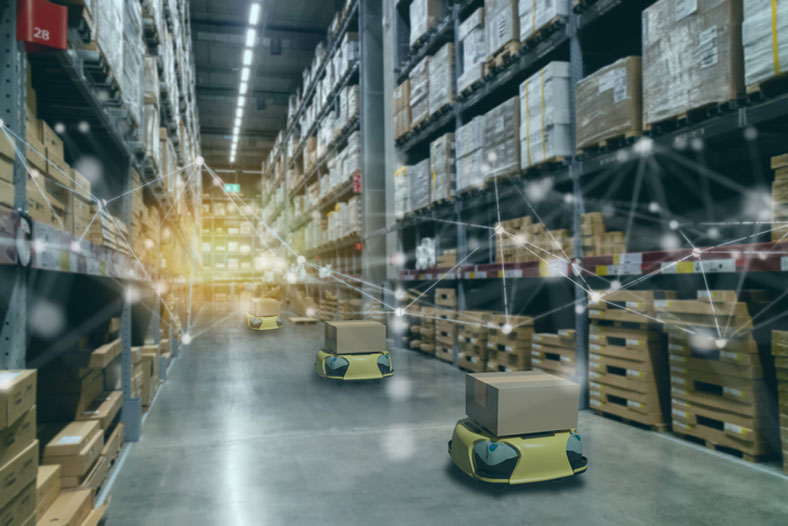Written by Scott Wilson
The blockchain might not secure semi-trailer loads, but it still has some very practical applications when it comes to getting goods and materials from point A to B.
Blockchain is a high-tech innovation in cryptographically secure and reliable data management.
Featured Programs:Sponsored School(s)
If you work in supply chain management, you just got a little warm glow from reading “secure and reliable.” And you may get exactly the opposite feeling knowing that blockchain is the underlying technology behind cryptocurrencies.
Could SCM Be the Real Winner that Comes Out of a Technology Born from Cryptocurrencies?
 Bitcoin, the first cryptocurrency, minted in 2009, started to take off like a rocket in value in 2017, reaching a height of $61,359 per 1BTC in September of 2021.
Bitcoin, the first cryptocurrency, minted in 2009, started to take off like a rocket in value in 2017, reaching a height of $61,359 per 1BTC in September of 2021.
Yet today, a single BTC is worth less than half that. In a classic Dutch tulip-bulb style bubble, Bitcoin and its many imitators and self-described improvers made early speculators rich on the backs of subsequent investors.
The use case for blockchain in supply chain management doesn’t necessarily have much to do with the financial aspects of the technology, but it’s an interesting backstory, nonetheless.
Creative Innovations in Supply Chain Tracking May Come From Strange Origins

While we’re rolling out the back story for context, let’s take another short side-trip that helps tell the SCM-blockchain story.
As it turns out, when the microwave oven was invented, it wasn’t by someone sitting down trying to invent a microwave oven.
Instead, an engineer named Percy Spencer was working in the late 1940s on boosting power levels for military-grade magnetrons to be used in radar sets. After performing a lab test with one of the magnetrons, Percy noted that a peanut cluster bar that he had in his pocket had melted.
From that sticky bunch of melted peanuts emerged a mainstay of kitchens around the world today.
The electromagnetic radiation emitted from the magnetron bounced off the metal of ships and planes to create a radar return. But Spencer found that it could be absorbed by the molecules of food and excite them, creating heat… enough heat to cook an egg or melt a peanut cluster.
Like microwave radiation, blockchain doesn’t just have one application. It’s a tracking method, at heart. In the same way you can use it to keep track of who has a chunk of cryptocurrency with absolute assurance that no one else can spend it, you can also use it to validate that a package got on that last truck out of Topeka, no matter what the warehouse manager says.
And this is exactly why you keep hearing about blockchain in relation to supply chain management.
How Blockchain in SCM Works

The technology is complicated, but the essence is that a sequence of transactions can be made and shared without risk of being tampered with. Once an entry in the ledger is made, the cryptographic signature secures it.
Supply chain managers are already intimately familiar with ledgers, of course. Whether it’s an old-fashioned paper logbook, a cobbled-together Excel spreadsheet, or a state-of-the-art ERP database, it’s how you know what comes and goes out of your logistics system.
One of the essential difficulties of traditional ledgers is the difficulty of sharing them securely. Opening up your database to other departments, other vendors, or clients comes with the risk of exposing information inadvertently. And in cases where you want to collect data from any of those sources and enter it into your ledger, you risk fraud or error.
With the hangover from the pandemic continuing to worry executives about the risks of distributed supply chains, blockchain technology could offer a security blanket for procurement networks.
But because blockchains are decentralized, the need for them to be shared is built into the design. And that also makes them redundant, so it’s impossible to lose the information they hold. And because they are cryptographically secure, the data is both traceable and immutable. You can see exactly where every entry came from and know that it is validated.
So Where Are All The Amazing Blockchain-based Supply Chain Management Systems, Then?

In some ways, the case for blockchain in supply chain management technologies hasn’t really been explored yet. Most of the applications are purely theoretical or haven’t even been built.
There are basically two uses that blockchain technology could perform in supply chain management:
- Self-executing contracts - By offering a definitive proof of transaction through code, blockchain ledgers could enable greater efficiency in supply chain operations. As a box of oranges passed through an RFID reader it creates a new entry in the ledger with a specific signature. A procurement contract, written into the blockchain code itself, could detect the entry and instantly and automatically issue payment in the currency issued on the same chain.
- Sourcing validation - Validated ledgers are extremely valuable for tracing products through complex sourcing chains. This can be a big concern in retail, precious metals, healthcare, or national security supply chains, where it’s absolutely essential to know where an item has been on each stage of its journey to the end-user. As more and more businesses become concerned with ESG (Environmental, Social, and Governance) considerations, this will also be a way to prove that supply chains are sustainable. Blockchain allows that to happen with complete assurance even if the item passes through many hands along the way.
Of course, there are conventional ways that these functions are performed. Using blockchain technology instead would introduce greater security and efficiency than the existing methods, however.
At this time, most of the active projects to put blockchain tools into use are being brought to you by the same people who invented the exploding cryptocurrency projects, not SCM organizations themselves.
Still, some big names in the SCM and business solutions software worlds are introducing blockchain tech: DHL, Oracle, and IBM have all started pilot projects in blockchain tracking.
Details are sparse and it’s unclear how many users they have, but it’s clear the technology has got some attention.
But There’s Two Sides to the Blockchain Coin

Another big-name entry comes from Amazon in the form of their Quantum Ledger Database. Although it’s neither quantum nor blockchain-based, it does offer a cryptographically viable ledger to offer robust tracking of data changes.
This may be the blockchain-inspired future of cryptography in supply chain management. While this leaves some of the utopian visions of blockchain fans in the dust, it may deal with some of the more practical needs of the logistics community. Most businesses recognize the reality of governmental oversight and adjudication of disputes. They may prefer that banks handle big financial transactions rather than leaving it to code.
For some companies, blockchain looks like a complicated solution in search of an obscure problem.
There’s not a lot that blockchain has to offer over and above a plain old database ledger if you’re not concerned with sharing and forgery. In fact, it’s less efficient than just about any other sort of data store and tracking system. Detractors argue that blockchain systems are just one more complicated technology that could break down and disrupt the chain.
The blockchain community also suffers from an excess of idealism that doesn’t always align with real-world commercial needs.
Although openness is something that consumers may want, it’s not something most businesses are eager to embrace. For reasons of competitive advantage, the kind of data a blockchain could validate might be exactly what they don’t want to share.
Larger companies are actually beneficiaries of the status quo of privately held data.
Efficiency isn’t always the end goal of businesses, at least not when it comes to paying their bills. So while self-executing contracts sound appealing to transport, storage, and logistics vendors, many of their customers might prefer to stick with the existing system of receiving an invoice, but waiting till the start of a new quarter to issue payment.
So it seems likely that the current iteration of blockchain tech in supply chain management isn’t going to take the world by storm. But that doesn’t mean that blockchain hasn’t melted a few peanut clusters in pockets along the way… keep your eyes open for what emerges next.








